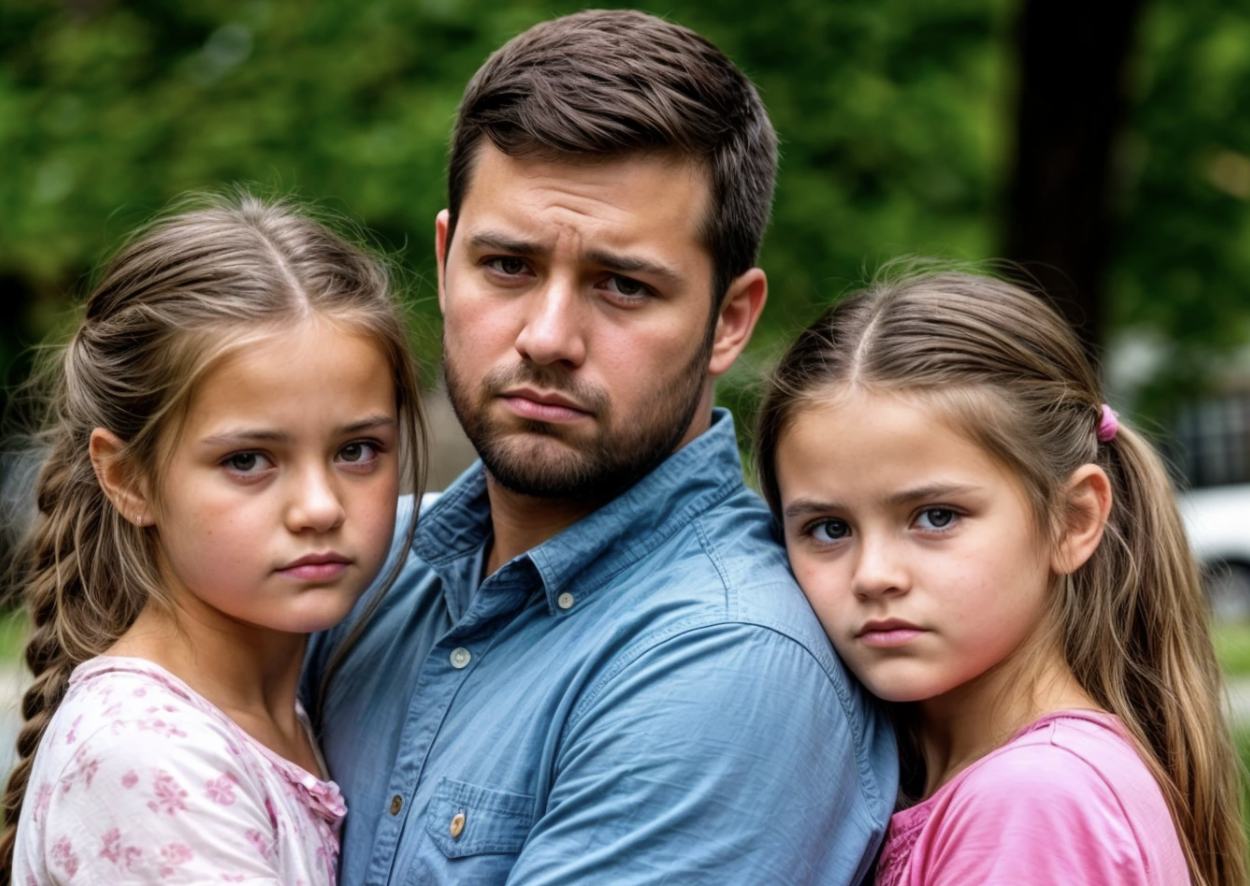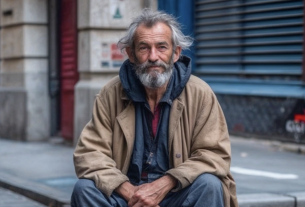“Look at her! How beautiful she is!” I exclaimed, holding the warm little body of our newborn daughter close to me. Lizochka lay wrapped in a soft blanket, curled up like a tiny bundle of life, quietly breathing. I couldn’t take my eyes off her. At that moment, the world narrowed down for me to one face, one breath, one thought: “She’s mine. She’s ours.”
Sasha stood nearby. He was looking at the baby, but his gaze was mixed with tenderness and… something else. Something vague, almost frightened. He reached out his hand and gently touched the girl’s cheek with his finger.
“She looks like you,” he said softly, almost in a whisper. But in his voice, there was none of the bright joy I had expected. No overflowing happiness. At the time, I didn’t pay much attention to it. Well, she looks like me — so what? The main thing was that our family had grown, that our daughter was healthy, and now we were real parents.
But years passed, and when our second daughter, Masha, was born, I began to notice what I had previously refused to see. Both girls looked strikingly alike. Their big brown eyes, neat little noses, high foreheads, thick dark hair — all seemed copied from a portrait of my father. It was as if they came from the same frame, where he was captured as a child. Not a single feature of Sasha was in them. Neither his blue eyes, nor the dimples on his cheeks, nor even his distinctive expression. This became a problem. A serious and painful one.
I was sitting at the kitchen table, mechanically stirring the long-cold tea. Behind me came the steady breathing of the sleeping girls, and in front of me, with a strange expression on her face, sat my mother-in-law — Valentina Ivanovna. She had “just dropped by,” as she usually said. But I knew: such visits didn’t happen by chance. Especially after the last few months when misunderstandings, unspoken words, and cold hostility had been building between us.
“Vika,” she began, choosing her words carefully, as if afraid to offend, “the girls are, of course, beautiful. But… are you sure they’re Sasha’s? They look too much like your father. Like two drops of water. It’s simply amazing, isn’t it?”
The spoon in my hand clinked against the edge of the cup. I froze. These words had been said before — in jokes, hints, whispers. But coming from her, a woman who called me “dear,” it sounded especially painful. Like a blow below the belt.
“Valentina Ivanovna, what are you saying?” my voice trembled. “Of course, they’re Sasha’s! You know everything yourself! We waited for them so long, I gave birth, he himself picked them up from the maternity hospital! How can you doubt it?”
She only shrugged, as if to say, “Who knows.” And in that gesture lay her full confidence that doubt had its place. I felt a tightening pain inside — both hurt and anxiety. Because the worst thing wasn’t those words. The worst thing was that my husband also began to drift away from our children.
“Sash, why didn’t you pick up Liza from kindergarten again?” I asked when he came home late, almost at dawn. Liza was already asleep, Masha was quietly dozing on the sofa. And I, exhausted after a double shift, housework, and constant worries, barely stood on my feet.
“I forgot, sorry,” he said indifferently, throwing his jacket on a chair without looking at me. “Had a lot to do.”
“You’re always busy,” I couldn’t hold back. “When do you spend time with the kids? When was the last time you played with Masha? Or at least read a book to Liza?”
He was silent. A long, heavy silence, then his voice broke through — quiet, but so heavy:
“I don’t feel drawn to them, Vika. I don’t know why. They… they seem like strangers to me. I try, I make an effort, but I don’t feel they’re mine.”
Tears welled up in my throat. How could he say that about his own daughters? The very children he once longed for, dreamed of? But at some point, I realized — he was sincere. Sasha really wanted a daughter who looked like him. He imagined playing with her, feeling proud when she inherited his features. He wanted to see himself in her. But instead — two girls who looked more like my father. As if I was the only one who gave birth to them.
I started searching the internet, reading about genetics, heredity, laws of dominant and recessive genes. It turned out that this happens. Sometimes a child’s appearance can resemble grandparents more than parents. My father had very strong genes — brown eyes, a high forehead, dark hair. And both my daughters inherited those. But how to explain this to Sasha and his family if they had already made their conclusions?
I suggested doing a DNA test. Not because I doubted, but to close the issue once and for all. But he refused.
“I believe they’re mine,” he said, looking down. “It’s just… I can’t explain it. I don’t feel connected to them.”
“Have you tried?” I almost shouted. “Tried to be with them, play, talk, be a father? Or are you just waiting for them to become close to you by themselves?”
He was silent again. And in that silence, I felt our family collapsing, a gulf growing between us.
It was even worse with his relatives. My mother-in-law and sister-in-law behaved as if Liza and Masha were not their own. They came rarely, and if they did, it was mostly to discuss how the children were “not like Sasha.” Once, Katya, my sister-in-law, laughingly said:
“Vika, are you sure you didn’t have them by your grandfather?” and laughed as if it were a joke.
I couldn’t stand it:
“Katya, this is no longer a joke. These are my children, and they are your brother’s. If you don’t like it, you don’t have to come.”
Of course, she was offended. But what else could I do? I was raising two daughters alone while Sasha “didn’t feel the connection,” and his family only intensified the pain. My parents lived far away and were getting older. I felt lonelier than ever.
And then one evening, when the girls were already asleep, I decided to have a serious talk. I understood we couldn’t go on like this. Either we find a way out, or our family will fall apart completely.
“Sash,” I began, trying to stay calm, “I know you’re upset. I also dreamed we’d have a daughter who looked like you. But these are our children. They’re not to blame for inheriting my genes. And neither am I. It hurts me to see you pulling away from them.”
He was silent for a long time, then sighed deeply:
“I hate myself for it. But every time I look at them, I see your father. And it feels like I don’t belong here.”
I took his hand:
“You do belong. You’re their father. They love you, even if you don’t see it. Yesterday, Liza asked why dad doesn’t play with her. Masha reaches out to you, but you turn away. They feel it, Sash. They’re still little, but they understand everything.”
He lowered his head. I saw how hard it was for him. Then I suggested:
“Let’s try to start small. Just spend more time with them. Don’t think about who they look like. Just be there. They’re your daughters.”
Several months have passed since that talk. Sasha began to change. Not immediately, not perfectly, but he made progress. On weekends, he started picking Liza up from kindergarten, taught her to tie shoelaces, read to Masha before bed. He bought them building sets, drew with them, told stories, sometimes even made up his own. I saw how the girls began to reach out to him. Liza now proudly tells her kindergarten friends, “Dad helped me build a car from blocks.” Masha, who used to cry when I left her with Sasha, now runs to him with joyful squeals.
It was harder with his relatives. Mother-in-law still sometimes made biting remarks, but I learned to just ignore them. I realized: I can’t force them to love my children, but I can protect my family from their influence.
We never did the DNA test. Sasha said he no longer needed it. Over time, he began to see not just faces but personalities, habits, movements in the girls. For example, Liza, like him, wrinkles her nose when she laughs. And Masha loves it when he plays music for her — just like he did as a child.
Our family is far from perfect. Sometimes I catch myself still angry at Sasha for his past indifference. Sometimes I want to yell at his relatives for their words. But I see how he tries. How he’s learning to be a father. And I believe love for children isn’t about looks. It’s about time spent together. Every “good night,” every tear you wipe away. That connection you build with your hands, heart, and patience.
And I’m grateful that this connection finally happened.



